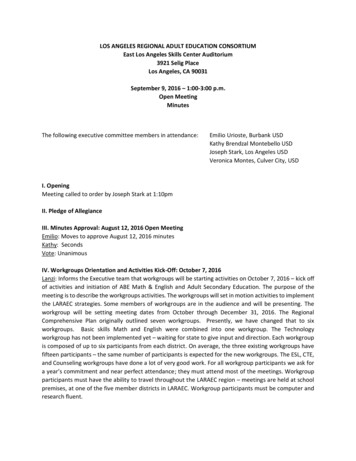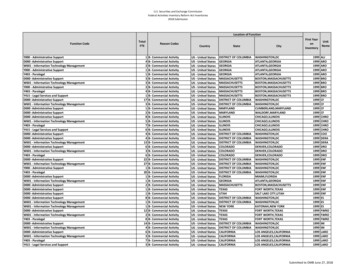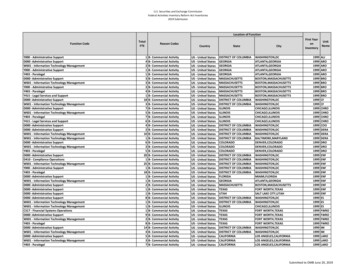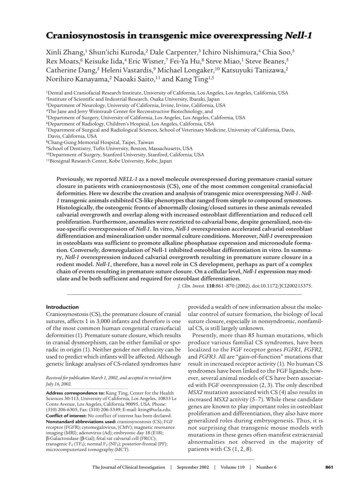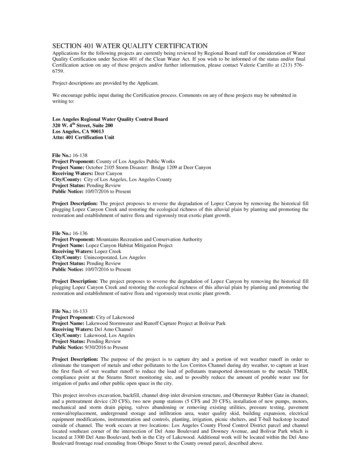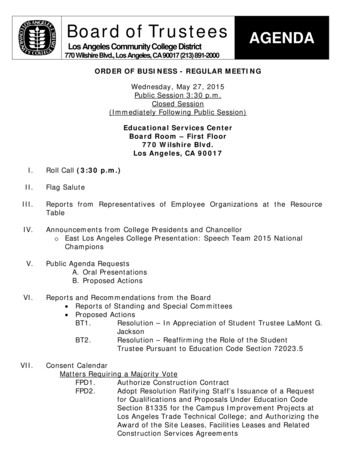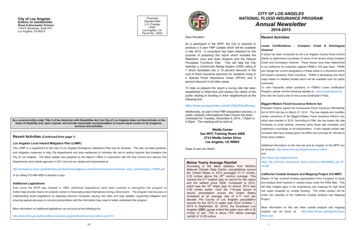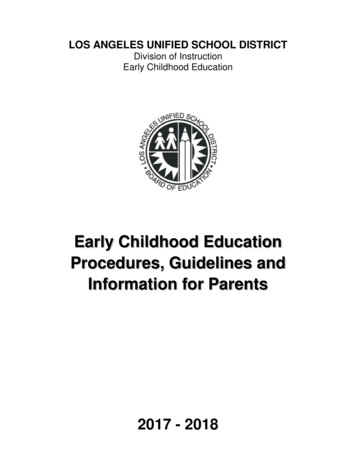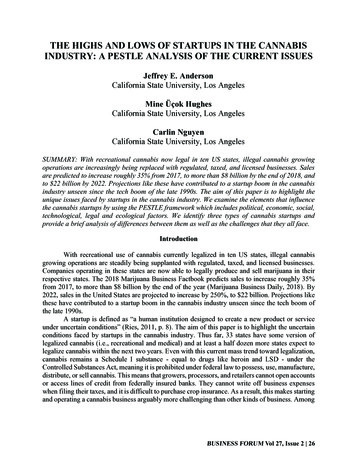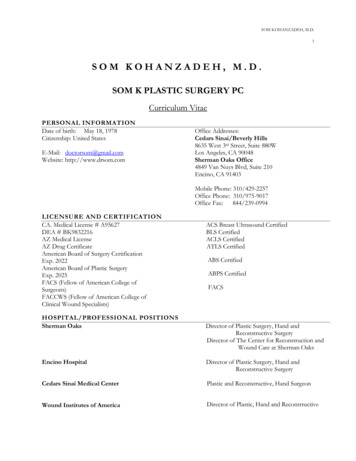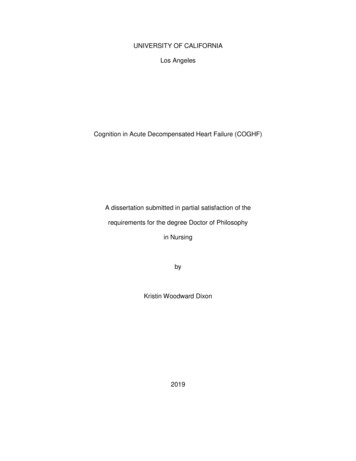
Transcription
UNIVERSITY OF CALIFORNIALos AngelesCognition in Acute Decompensated Heart Failure (COGHF)A dissertation submitted in partial satisfaction of therequirements for the degree Doctor of Philosophyin NursingbyKristin Woodward Dixon2019
Copyright byKristin Woodward Dixon2019
ABSTRACT OF THE DISSERTATIONCognition in Acute Decompensated Heart Failure (COGHF)byKristin Woodward DixonDoctor of Philosophy in NursingUniversity of California, Los Angeles, 2019Professor Lynn Doering, ChairObjectives: Our objectives were to understand the patterns of cognitive and depressive changeduring and following a hospital admission for Acute Decompensated heart failure (ADHF) and toexamine the relationship of clinical variables related to cognition over time and 30 dayreadmissions.Methods: After hospital admission to a medical-surgical floor, within seven days followinghospital, and after 30 days following hospital discharge, 40 patients admitted for ADHF (mean[SD] age 73.8 [11.3] years; 72% male) completed the Montreal Cognitive Assessment(MoCA), Trail Making A & B, the Patient Health Questionnaire (PHQ)-9, and the Brief SymptomInventory – Anxiety (BSI-A). The Medical Outcomes Study Social Support Survey (MOS-SSS)and the Self-Care Heart Failure Index (SCHFI) was completed in the hospital. Cognitive anddepressive symptoms were evaluated using repeated-measures analysis of variance.Demographic and clinical variables associated with trends of cognitive and depressivesymptoms were described with Kendall’s Tau correlations. Linear regressions were performedto determine if change in fluid volume status measurements were related to change of MoCAscores, controlling for demographical and clinical variables. Separate linear regressions wereii
performed to determine if variables in the hospital were related to MoCA scores in the hospital,MoCA scores at 30 days post discharge, and the occurrence of 30 day readmissions.Results: Neither global MoCA or TMT scores improved from hospital to 30 days post discharge.Improvement in the MoCA sub domain Visuospatial/ Executive function and depressivesymptoms from hospital discharge to 30 days were observed. Four groups of MoCA changeand three groups of depressive symptom change were found and associated with varied clinicaland demographic variables. In multivariate analysis, only changes in weight (p .001), HJR(p .036), not clinical and demographical variables, were related to change of MoCA score. Inmultivariate analysis, only hospital variables CCI (p .014) and anxiety (p .005) were related toMoCA in the hospital; in a separate analysis only CCI (p .05) remained related to MoCA post30 days of discharge. In a fourth multivariate analysis, only CCI (p .083) trended in associationwith 30 day readmission.Conclusions: Executive function and depressive symptoms improve from hospitalization to 30days after for ADHF. Higher anxiety symptoms and comorbidities are independently associatedwith worse cognition in the hospital. Findings suggest that when HF patients are in fluidoverload, their cognition is worse. Clinicians should assess the patient’s cognitive, anxiety anddepressive state in the hospital prior to teaching the patient as learning abilities are likelycompromised. Further research is needed to explore these relationships and ultimately, to testinterventions that may help HF patients with CI avoid unnecessary admissions.iii
This dissertation of Kristin Woodward Dixon is approved.Paul Michael MaceyJo-Aann O. EastwoodMario C. DengLynn V. Doering, Committee ChairUniversity of California, Los Angeles2019iv
DedicationNo great accomplishment is completed alone. I would like to dedicate my dissertation tomy husband, Joshua and my son, Luke. Thank you for your continued unconditional love andsupport. To my father and mother, thank you for inspiring me to become a nurse, teaching mehow to be dedicated to my work and family, and supporting me in every step of this journey. Tomy brother and my sister-in-law, thank you for having faith in me throughout this journey androle modeling persistence. To my grandma, thank you for believing in me every step of the way.And to my gracious God, thank you for sustaining me on this amazing journey. Psalms 139 910: If I rise on the wings of the dawn, if I settle on the far side of the sea, even there your handwill guide me, your right hand will hold me.v
Table of ContentsAcknowledgments . ixCurriculum vita . xChapter 1—Introduction . 1Chapter 1—References . 15Chapter 2—Review of Literature . 21Chapter 2—References . 42Chapter 3—Theoretical Framework . 52Chapter 3—References . 65Chapter 4—Methods . 74Chapter 4—References . 102Chapter 5—Results . 109Chapter 5—References . 145Chapter 6—Discussion . 146Chapter 6—References . 182Appendices . 197vi
List of Figures and TablesChapter 3—Table 1 . 69Chapter 3—Table 2 . 70Chapter 3—Figure 1. 71Chapter 3—Figure 2. 72Chapter 3—Figure 3. 73Chapter 5—Table 1 . 120Chapter 5—Table 2 . 121Chapter 5—Table 3 . 122Chapter 5—Table 4 . 123Chapter 5—Table 5 . 124Chapter 5—Table 6 . 125Chapter 5—Table 7 . 126Chapter 5—Table 8 . 127Chapter 5—Table 9 . 127Chapter 5—Table 10 . 127Chapter 5—Table 11 . 129Chapter 5—Table 12 . 130Chapter 5—Table 13 . 130Chapter 5—Table 14 . 131Chapter 5—Table 15 . 132Chapter 5—Table 16 . 132Chapter 5—Figure 1. 133Chapter 5—Figure 2. 134Chapter 5—Figure 3. 135Chapter 5—Figure 4. 136Chapter 5—Figure 5. 137Chapter 5—Figure 6. 138Chapter 5—Figure 7. 140vii
Chapter 5—Figure 8. 141Chapter 5—Figure 9. 141Chapter 5—Figure 10. 142Chapter 5—Figure 11. 143Chapter 5—Figure 12. 144viii
AcknowledgementsI would like to acknowledge Dr. Cindy Steckel and Dr. Tom Heywood for their guidanceand support to complete this research at Scripps Health in San Diego. Additionally to mynursing research assistants who gave their time and attention to this study: Heidi Arens, EllenAshman, Dawn Hutson, Nancy Blakely, Laura Moreau, and Melissa Miller. I would like toacknowledge Scripps Health for allowing me to conduct research at their institution as well asthe team of clinicians there who diligently care for the patients every day. Lastly, I would like toacknowledge my outstanding committee members for their time and dedication to mydevelopment as a Nurse Scientist! And a special thank you to my Committee Chair, Dr. Doering,for your mentorship, inspirational leadership, continual guidance throughout my time at UCLA.ix
KRISTIN W. DIXONEDUCATIONLoma Linda UniversityLoma Linda, CA2007- 2009 Clinical Nurse Specialist Adult & Aging / Medical-Surgical NursingPoint Loma Nazarene University2002-2006 B.S. NursingSan Diego, CAEXPERIENCEScripps Memorial Hospital La JollaAdvanced Practice Nurse, Cardiac ServicesAugust 2009 to presentLa Jolla, CAScripps Memorial Hospital La JollaRegistered Nurse, Cardiac Care CenterJune 2006-August 2009La Jolla, CALICENSURE AND CERTIFICATIONS Progressive Care Certified Nurse- K Certification – 2019 to present Certified Adult CNS- September 2014 to present Certified Heart Failure Nurse – 2011 to present Progressive Care Certified Nurse Certification – 2010 to 2019 Clinical Nurse Specialist in the State of California – 2009 to present California Public Health Nurse Certification – 2007 to present Scripps Telemetry Certified Nurse – 2006 to present Registered Nurse – 2006 to present ACLS and CPR Certifications – 2006 to presentRESEARCH FELLOWSHIPS Evidenced Based Practice Consortium, San Diego, CA, Spring 2010 – Fall 2010--Mentored two projects 1) Standardizing Management of Patients with Severe Sepsis 2)The Effect of Indwelling Urinary Catheter Documentation Standardization. Honors Scholar, Point Loma Nazarene University, San Diego, CA, 2005 – 2006--Developed grounded theory model to thesis: Perceptions of Individuals who areHomeless: Health Care Access and Utilization in San Diego.x
PUBLICATIONS Haley, R.J. & Woodward, K.R. (2007). Perceptions of individuals who are homeless:Healthcare access and utilization in San Diego. Advanced Emergency Journal of Nursing,29(4), 346-356.INVITED PRESENTATIONS Podium Presenter at Scripps Health Nursing Grand Rounds 2015, 2016, 2017, 2018,2019 Podium Presenter at California Clinical Nurse Specialists Conference 2015 Podium Presenter at National Association Clinical Nurse Specialists Conference 2015 Podium Presenter at Sigma Theta Tau San Diego Spring Program 2015 Poster Presenter at American Association of Heart Failure Nurses (AAHFN) Conference2014 Podium Presenter at Scripps Heart Failure Nurses Conference 2014 Podium Presenter STTI Odyssey Conference 2013 Poster Presenter at Western Institute of Nursing Conference 2013 Podium Presenter at Scripps Heart Failure Nurses Conference 2013 Poster Presenter at AAHFN Conference 2012 Poster Presenter at ACCA Cardiovascular conference 2011 Poster Presenter at National Nursing Staff Development Organization Conference 2011 Poster Presenter at AAHFN Conference 2010 Podium presentation at American Public Health Association Annual Meeting 2008 Poster presentation at Sigma Theta Tau International Biennial Convention 2006 Poster presentation at National Primary Care Nurse Practitioner Symposium 2006 Podium presentation at PLNU Honors Scholar Conference 2006 Poster presentation at Western Institute of Nursing Conference 2006 Podium presentation at Qualitative Health Research Conference 2006 Poster presentation at Southern California STTI Research Conference 2005 Poster presentation at International Nursing Research Congress 2005HONORS AND AWARDS PCNA Heart Failure Prevention Research Award 2015 Best Nurse in a Supporting Role Scripps Memorial Hospital La Jolla 2014 Values in Action Scripps La Jolla Nominee 2012 Dean’s Award M.S.N. program Loma Linda University 2009 Scripps Telemetry Teacher of the Year Award 2009 Scripps Memorial Hospital La Jolla “Nurse of the Year” Honoree 2008 Scripps Memorial Hospital La Jolla “Rookie” Nurse of the Year Award 2007 Scripps Memorial Hospital La Jolla 6 West Florence Nightingale Award 2007 Wesleyan Scholarship Foundation Honors Scholar Thesis Award 2005-2006 P.L.N.U. Honor Scholar 2005-2006xi
COGNITION IN ACUTE DECOMPENSATED HEART FAILUREChapter 1Introduction1
COGNITION IN ACUTE DECOMPENSATED HEART FAILUREIntroductionCognitive impairment (CI) is a common phenomenon in patients with heart failure (HF).Its prevalence and its importance to successful multidisciplinary and participatory managementof HF have received growing recognition (Pressler, 2008). Pressler (2008) reports 25% to 50%of persons with HF likely live with some degree of CI. Moreover, CI has a major role in healthoutcomes for cardiac patients (Festa et al., 2011). In the literature, it has been reported that CIis implicated in higher mortality related to HF and is a major contributor to hospital readmissions(Cameron et al., 2010; Harkness, Demers, Heckman, & McKelvie, 2011). Yet, a gap in theliterature exists regarding the causal relationship between HF and CI (Harkness et al., 2011).To date few studies has shown the characteristics of CI in acute decompensated HF(ADHF) patients. Little evidence is available showing how CI changes from an acutedecompensated event in the hospital to an improved cognitive recovery after discharge.Understanding the characteristics of CI in ADHF will guide the development of nursinginterventions to prevent 30-day readmissions and thus will have a major impact on healthcarecosts and mortality associated with this disease. The outcome of needed research in this areacould shape future studies on interventions for ADHF patients with CI at time of discharge, andanswer questions considering HF patients’ non-adherence following a hospital admission.Significance to Nursing PracticeSimilar to other chronic diseases, individuals with HF are involved in managing theirpsychological and physiological care (Ditewig, Blok, Havers, & van Veenendaal, 2010). Themedical management of HF is primarily pharmacologic; however, maximizing patient’s quality oflife by advocating self-sufficient living, social functioning, and psychosocial welfare is equallyimportant (Hui et al., 2006). This involves preparing the individual to make complex decisionsregarding his/her own daily care. The self-care behaviors demonstrated by HF patients arecomplex, individualized, and dynamic. Cognitive impairment diminishes the individual HFpatient’s capability to make complex daily self-care decisions and thus contributes to behaviors2
COGNITION IN ACUTE DECOMPENSATED HEART FAILUREsuch as poor adherence to health care regimens, which in turn result in frequent hospitalizations(Bauer, Johnson, & Pozehl, 2011). There are many factors in this population that couldcontribute to CI including sleep apnea, depression, dementia, and delirium (Cameron et al.,2010; Kumar et al., 2011; Stanek et al., 2009; Vogels et al., 2007). The characteristics of CI inHF in the outpatient setting have been measured as a decline of attention, concentration,memory loss, psychomotor speed, executive function, memory language, and visuospatialfunction (Riegel et al., 2002; Stanek et al., 2009). To date, researchers have not adequatelyexamined the relationship of CI, in all of its complexities, to ADHF and to subsequent HFreadmissions.Recent research has illuminated multiple aspects of poor HF self-care after discharge.In turn, these reports have generated increased demands that nurses provide comprehensiveHF education to the patients and families prior to discharge (Koelling, Johnson, Cody, &Aaronson, 2005). However, a patient’s compliance to an evidence-based HF regimen isdependent on many factors. Particularly important is the individual patient’s capability to retainknowledge in the presence of CI. The presence of CI and its characteristics in an individualpatient will define interventions that address his specific abilities to comprehend and retaininformation they are given (Bauer et al., 2011). Knowledge regarding the mechanisms by whichCI dimensions influence individual HF patients’ ability to learn and participate successfully inself-care after hospital discharge is needed to design and test future nursing interventionsaimed at helping HF patients with CI make successful transitions from hospital to home and toprevent repeated hospital readmissions.Significance for Delivery of CareUnnecessary readmissions are costly for both patients and hospitals. In 2009, theMedicare Payment Advisory Commission recommended that all hospital readmissions bereduced, and this recommendation become part of the Health Care Reform bill passed into lawMarch 21, 2010. Since October 2012, hospitals have been fined for all-cause HF readmissions3
COGNITION IN ACUTE DECOMPENSATED HEART FAILUREabove the national readmission average. In 2007, the cost of HF care surpassed 30 billiondollars, with individual readmissions found to cost over 23,000 (Wang, Zhang, Ayala, Wall, &Fang, 2010). Assuming cost savings of 20,000 per HF readmission, decreasing HFreadmissions by ten percent would generate annual savings of more than 500,000. Thesestatistics and changes in hospital reimbursements have created an accelerated response andattention to preventing HF readmissions at every institution across America (Chaudhry et al.,2011). Of note, Cameron et al. (2010) showed that patients with HF and CI have almost twotimes the risk of hospital admission. Thus, special attention to prevention of hospitalreadmission in this population is warranted.The Institute of Medicine Future of Nursing of 2010 advocates that allowing nurses topractice to the full scope of their education and training is essential to the provision of highquality cost efficient health care (Institute of Medicine Committee on the Robert Wood JohnsonFoundation Initiative on the Future of Nursing, 2011). Nurses, who are integral members of thehealth care team, must be involved in developing solutions aimed at reducing HF readmissions.Nurses contribute to the prevention of HF readmissions by providing integration of care andthorough follow-up (Koelling et al., 2005). Development of nursing interventions aimed at HFpatients with CI is critical because these HF patients are at the highest risk for hospitalreadmission. To provide high quality, cost effective care that lowers the risk of hospitalreadmissions, nurses need tested interventions based on knowledge of the relationshipbetween ADHF and CI.Summary of Chapter 2: Literature ReviewCognition is defined as the ability to recognize, learn, and remember information, andthen use it to reason or problem solve in new situations (Bauer et al., 2011). Pressler (2008)defined CI as the measurable decline within the domains of attention, concentration, memoryloss, psychomotor speed, executive function, memory language, and visuospatial function. Mild4
COGNITION IN ACUTE DECOMPENSATED HEART FAILURECI, defined by Cameron et al. (2010) to be “subtle cognitive deficits that do not meet the criteriafor dementia” (p. 509), is less understood than advanced CI. HF patients with moderate andsevere CI have more rehospitalizations and poorer clinical outcomes (Harkness et al., 2011;Pressler, 2008). The etiology of CI in HF is unclear. Low ejection fraction (EF) in HFpredisposes a person to CI because of reduced blood flow however those with normal EF alsosuffer from CI. Furthermore it is known that structural brain changes are present in HF patientswho have CI (Serber et al., 2008). Depression has also been shown to be an independentpredictor for cognitive decline (Pullicino et al., 2008). Fluid retention, electrolyte disturbance,certain medications, anemia, and depression may be interacting to produce a transient cardiacencephalopathy (Pullicino et al., 2008).One important relationship between CI and HF includes the presence of CI in differenttypes and classes of HF. Cognitive impairment has been reported in all New York HeartAssociation (NYHA) classes (Athilingam et al., 2011; Harkness et al., 2011). Vogels,Oosterman, et al (2007) found the NYHA class and the duration of HF to be independent riskfactors for CI. However, the length of disease is complicated because the majority of HFsubjects have comorbid conditions that contribute to CI, which include hypoxic conditions likesleep-disordered breathing and ischemic events from low cardiac output (Kumar et al., 2011),electrolyte disturbances (Pullicino et al., 2008), poor cerebral perfusion or unstable/low bloodpressure (Stanek et al., 2009; Vogels et al., 2007).Mild CI in HF. Cameron et al. (2010) studied mild CI in HF patients throughmeasurement with two tools. Cut-off scores indicating MCI for the Mini-Mental State Exam was26/27 and for the Montreal Cognitive Assessment (MoCA) was less than 26. They reportedelevated risk for CI in elderly males who were functionally compromised, had several co-existingco-morbidities, mostly lived alone, and had depression symptoms. Of these, 73% hadunrecognized CI. Furthermore, people with HF and mild CI presented with significantly lower5
COGNITION IN ACUTE DECOMPENSATED HEART FAILUREself-care confidence and self-care management scores than cognitive intact patients (Cameronet al., 2010).Association of HF with dementia. Heart failure doubles the risk of dementia amongolder adults (Festa et al., 2011). In those over the age of eighty with HF and dementia, cognitiondeclined more in episodic memory (Hjelm et al., 2011). When testing for dementia using theWatson clock- drawing test, in those who had HF and CI, structural brain changes were found tobe significantly correlated with abnormal Watson Clock drawing test scores (Serber et al.,2008).Association of HF with depression. The majority of the patients with severe HF haveCI, depression, or both; 70% percent have depression (Foster et al., 2011). Pullicino et al.(2008) found depression to be an independent predictor of cognitive decline and incident CIirrespective of HF status. Cameron et al. (2010) reported that changes in the cognitive domainsof processing speed and executive functions were most common in HF patients with mild CI.These cognitive domains are also impaired in those who have depressive symptoms (Foster etal., 2011; Thomas & O'Brien, 2008). Depression has also been related to the onset of disabilityand lack of participation in activities within people with CI and HF (Chaudhry et al., 2011; Fosteret al., 2011).Poor outcomes. When an individual has HF, he or she is 1.51 times more likely to haveCI than individuals without HF (Pullicino et al., 2008). In HF, CI is associated with relativelypoorer health outcomes (Cameron et al., 2010). Foster et al. (2011) found associations betweenCI in HF with disability, and a fivefold increased risk of death. Cognitive impairment is anindependent risk factor for noncompliance with medication use and medical appointments(Festa et al., 2011). Mild CI made the strongest contribution to predicting self-caremanagement; Cameron et al. (2010) found that those with HF and CI are 30% more likely tohave inadequate self-care confidence. Festa et al. (2011) found cognitive dysfunction to be anindependent risk factor of self-care behaviors. Those with HF and CI are more frequently6
COGNITION IN ACUTE DECOMPENSATED HEART FAILUREadmitted to the hospital; Harkness et al. (2011) reported 50% of those with abnormal scores onthe MoCA had been hospitalized in the last 6 months compared to 17% of those who had anormal MoCA score. From the data thus far, it is likely that CI negatively affects the capacities ofpeople with HF to assess their day to day status for warning signs, complete self-carebehaviors, and follow their medical care plan at home (Bauer et al., 2011).Summary of Chapter 3: Theoretical FrameworkCare for the patient with HF from hospital to home is complex. The ADHF patients needa network of support to transition well. Just as the patient’s needs are individualized, thepatient’s ability to be successful at home is also unique to the individual. The theoreticalframework of this study aims to connect the complexities of care for HF patients as theytransition home, with the concepts of what it takes to reduce the risk for 30 day readmission tothe hospital. Transition theories like Naylor’s Transitional Care Model (TCM) and Coleman’sCare Transitions Intervention (CTI) describe transitions in general terms that then must beapplied to each population and potential patient. The specific steps needed to successfullytransition a HF patient who is recovering from an acute decompensated event should be studiedwith the multitude of patient risk factors. The theoretical framework purposed in this studystrives to take into account these variables.Helping ADHF patients to be successful at home following hospitalization is a dependentprocess and situational in nature as described in situational learning disability (SLD). Ultimately,the patient’s success at home is dependent on the patient and or caregiver’s ability to learn andfollow the discharge care plan. Thus, the ADHF patient’s ability to avoid readmissions isdependent on their ability to learn. The literature and Model of Health Learning (MHL) suggestthat the patient’s cognitive state is responsible for the patient’s ability to learn, yet cognition israrely assessed in hospitalized patients. New knowledge is needed in order to develop effectiveinterventions for the ADHF patients to avoid readmissions. Understanding cognitive abilities andlearning processes of ADHF patients through the transition home is essential.7
COGNITION IN ACUTE DECOMPENSATED HEART FAILUREBringing together individual theories on transitions and learning define the variables of interestfor this study. The merged theory introduces a framework that draws on ideas from learningtheory and proposes that associatio
Loma Linda University Loma Linda, CA 2007- 2009 Clinical Nurse Specialist Adult & Aging / Medical-Surgical Nursing Point Loma Nazarene University San Diego, CA 2002-2006 B.S. Nursing EXPERIENCE Scripps Memorial Hospital La Jolla La Jolla, CA Advanced Practice Nurse, Cardiac Services August 2009 to present
